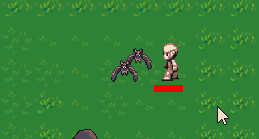Forum begins after the advertisement:
[Part 13] Playing the damage feedback on the damage location
Home › Forums › Video Game Tutorial Series › Creating a Rogue-like Shoot-em Up in Unity › [Part 13] Playing the damage feedback on the damage location
- This topic has 0 replies, 1 voice, and was last updated 1 year, 3 months ago by
Terence.
-
AuthorPosts
-
March 18, 2024 at 7:33 am #13588::
In Part 13, we added a damage feedback effect whenever the player receives damage.

If you’d like to improve upon it by playing it on the location where the enemy touches the player, you’ll need to add an additional
positionargument to theTakeDamage()function onPlayerStats:public void TakeDamage(float dmg, Vector3? position = null) { //If the player is not currently invincible, reduce health and start invincibility if (!isInvincible) { CurrentHealth -= dmg; // If there is a damage effect assigned, play it. if(damageEffect) Destroy(Instantiate(damageEffect, position ?? transform.position, Quaternion.identity), 5f); invincibilityTimer = invincibilityDuration; isInvincible = true; if (CurrentHealth <= 0) { Kill(); } UpdateHealthBar(); } }Essentially, what we’re doing here is adding an optional argument to
TakeDamage(), so that if we provide a 2nd optional argument to it, it will play the effect on the position provided (instead of playing it on the player’s position).The
position ?? transform.positionmeans we usepositionif it exists, otherwise we usetransform.position.Notice also that in the definition for the 2nd parameter, we have a
?behind theVector3. This makes theVector3nullable, as they usually cannot contain a null value.Once we modify the
TakeDamage()function, we now have to head toEnemyStatsand modify theOnCollisionStay2D()function, where damage is dealt to the player:void OnCollisionStay2D(Collision2D col) { //Reference the script from the collided collider and deal damage using TakeDamage() if (col.gameObject.CompareTag("Player")) { PlayerStats player = col.gameObject.GetComponent<PlayerStats>(); player.TakeDamage(currentDamage, col.GetContact(0).point); // Make sure to use currentDamage instead of weaponData.Damage in case any damage multipliers in the future } }Here, what we are doing is retrieving the first contact point between the enemy and the player, and providing the position of this point to our
TakeDamage()function. The contact point is retrieved from thecolparameter, which is provided to the function by Unity’s own collision engine.If you’ve implemented it right, the damage effect should now vary depending on where the enemy is touching you from.
View post on imgur.com
-
AuthorPosts
- You must be logged in to reply to this topic.
Advertisement below:
